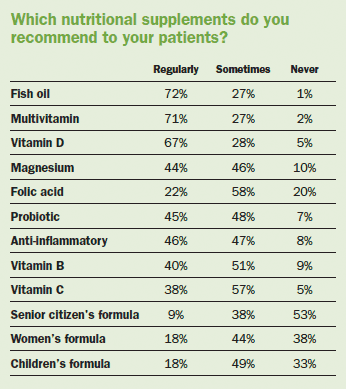Almost everyone suffers from nutritional deficiencies. Our food supply just doesn't seem to fulfill our nutritional needs these days.
As Dr. Tom Spicer of Minnesota told us: "Everyone needs to supplement based on the poor food quality we eat." Dr.
In addition, our environment has become one of toxicity instead of health. Nutritional supplements are needed because of "the excessive toxic load in today's environment, food, and water supply, and poor dietary choices," said Dr. Diane Curtis-Hutchens of California.
According to Dr. Grady Deal of Hawaii, "Nutritional supplements are necessary because most foods are deficient in basic nutrients. Nutritional supplements are necessary because they help protect and help detoxify the average person [who] is daily and routinely assaulted by toxins in food, water, air and medications."
These comments come from a recent survey on the need for nutritional supplements for our patients.1 This survey is part of an ongoing effort by Dynamic Chiropractic PracticeINSIGHTS to help doctors better understand the best way to incorporate nutritional products successfully into chiropractic practice.

What's Popular, What's Not
Most DCs believe nutritional supplements are critical to the health of their patients. Dr. B.F. Rocco of California put it this way: "The success of my practice depends on results that include restoring and maintaining a state of wellness for my patients. Since all body functions are dependent on a healthy, balanced metabolism, a treatment plan that excludes addressing the patient's nutritional deficiencies falls short."
What specific supplements are doctors of chiropractic recommending to their patients? The survey found that fish oil, multivitamins and vitamin D are by far the most regularly recommended. Specialized formulations for seniors, women and children had by far the highest reports for being "never recommended."
Time and Typical Amounts
Doctors make supplement recommendations at different times in their interaction with their patients. Almost half (49 percent) of DCs make recommendations during their report of findings or during the first follow-up exam. Almost a third (29 percent) make their recommendations after specific lab tests designed to reveal their patients' nutritional needs. The remaining DCs make recommendations during the initial examination or at other points in the care process.
Dr. Todd Austin of Illinois made this observation: "When I discover that a patient is suffering from specific nutritional deficiencies, I recommend the appropriate supplements, and the patient takes my advice, [they tend] to get better much quicker than a patient with a similar complaint who didn't take my advice and thus is only receiving chiropractic care. Therefore, it helps the patient to heal up quicker and makes my job as the chiropractor easier!"
That said, 61 percent of DCs provide only a 30-day supply of the supplements they recommend. Another 19 percent provide a 60-day supply, with the remaining 20 percent providing a supply of 90 days or more.
Follow-Up
Once the initial supply of supplements is provided to the patient, over half the time (52 percent) the doctor is the one following up to ensure that the patient is getting additional supplements as they run out. Less than a third of the time, the front-office person (17 percent), office manager (5 percent) or chiropractic assistant (6 percent) follows up with the patient.
Sadly, the rest of the DCs we surveyed admitted that they don't do any follow-up once the patient has their first supply of supplements in hand. There are no DCs using automated e-mail or phone systems to follow up on patients' supplement needs, according to our survey. Part of the reason for the lack of follow-up by some DCs may be the way they record what supplements their patients are taking. Two-thirds (67 percent) still record supplement use in paper files. Electronic health records are used by 19 percent of DCs surveyed, with another 4 percent using software other than EHR.
More than three-quarters of DCs (76 percent) choose to offer supplements that are sold only through a health care profession. Only 2 percent of doctors stated that they preferred to sell a nutrition line available in retail stores. The remaining 22 percent are happy either way.
In-Office Pricing
When asked how they price the supplements they provide their patients, most DCs (71 percent) said they stay with the suggested retail price. Others choose to offer discounts of 10 percent (9 percent of DCs surveyed), 20 percent (5 percent of DCs surveyed) and 30 percent (2 percent of DCs surveyed. The remaining doctors said they use another method to determine price.
Dr. Ronald Georgi of California noted, "Patients get well faster and the vitamin dept. has paid the rent in our office since 1949. In some years there would be no office without supplement sales." Dr. Michael Reed of Arizona agreed, "Supplements enhance patient response to treatment. I can be sure what they buy isn't a waste of their money. The profit to me is excellent."
But not all DCs look at nutritional supplements as a way to increase their practice income. Dr. Mathias Pastore of Virginia stated, "I don't consider supplement sales an important part of my practice. I carry what I take personally, and I advocate supplementation as a wellness activity.
The Bottom Line
At the end of the day, nutritional supplements are about increasing the health of your patient. Doctors who utilize nutrition effectively report that they are very pleased with the results in their practice. As Dr. Forest Mapes of Illinois put it, "They are the foundation that my practice is built on."
Reference
- DCPI Nutritional Supplement Survey. MPA Media, April 26, 2011.
Click here for more information about Donald M. Petersen Jr., BS, HCD(hc), FICC(h), Publisher.





